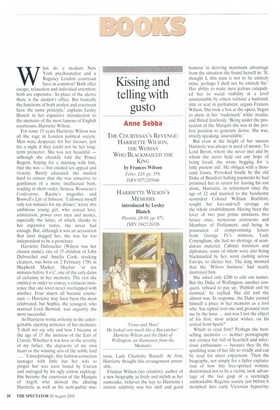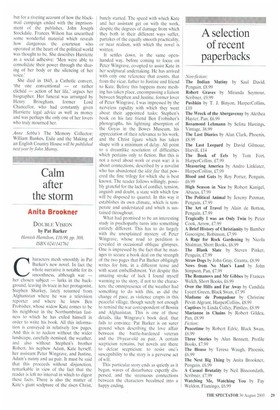Kissing and telling with gusto
Anne Sebba
THE COURTESAN'S REVENGE: HARRIETTE WILSON, THE WOMAN WHO BLACKMAILED THE KING by Frances Wilson Faber, 420, pp. 359, ISBN 0571205046 HARRIETTE WILSON'S MEMOIRS introduced by Lesley Blanch Phoenix, £9.99, pp. 471, ISBN 1842126326 What do a modern New York psychoanalyst and a Regency London courtesan have in common? Both offer escape, relaxation and individual attention; both are expensive. 'In place of the alcove there is the analyst's office. But basically the functions of both analyst and courtesan have the same principle,' explains Lesley Blanch in her expansive introduction to the memoirs of the most famous of English courtesans, Harriette Wilson.
For some 15 years Harriette Wilson was all the rage in London political society. Men were desperate for her favours, just for a night if they could not be her longterm protector. She was not beautiful — although she cheekily told the Prince Regent, hoping for a meeting with him, that she was — but exuded sex appeal and vivacity. Barely educated, she studied hard to ensure that she was attractive to gentlemen of a more intellectual bent, reading in short order, Seneca, Rousseau's Confessions. Racine 's tragedies and Boswell's Life of Johnson. 'I allowed myself only ten minutes for my dinner,' wrote this ambitious young girl, who craved love, admiration, power over men and money, especially the latter, of which, thanks to her expensive tastes, she never had enough. But, although it was an accusation that later dogged her, she was far too independent to be a prostitute.
Harriette Dubouchet (Wilson was her chosen name), one of 15 children of John Dubouchet and Amelia Cook, stocking cleaners, was born on 2 February 1786 in Shepherd Market, Mayfair 'at ten minutes before 8 o'c', one of the only dates of certainty in her memoirs. The rest she omitted in order to convey a virtuous insistence that one lover never overlapped with another, Four sisters all became courtesans — Harriette may have been the most celebrated, but Sophia, the youngest. who married Lord Berwick, was arguably the most successful.
As Harriette wrote artlessly in the unforgettable opening sentence of her memoirs, .I shall not say why and how I became at the age of 15 the mistress of the Earl of Craven. Whether it was love or the severity of my father, the depravity of my own heart or the winning arts of the noble lord .. . ' Unsurprisingly, this fashion-conscious teenager with little but her wits to propel her was soon bored by Craven and outraged by his ugly cotton nightcap. She became the courtesan of the Marquis of Argyll, who desired the alluring Harriette as well as his semi-public mis tress, Lady Charlotte Russell. At first, Harriette thought this arrangement untenable.
Frances Wilson (no relation), author of a new biography as lively and stylish as her namesake, believes the key to Harriette's instant celebrity was her skill and good humour in deriving maximum advantage from the situation she found herself in. 'If, thought I, this man is not to be entirely mine, perhaps I shall not be entirely his.' Her ability to make men jealous catapulted her to social visibility at a level unattainable by others without a husband, title or seat in parliament, argues Frances Wilson. She took a box at the opera, began to dress in her 'trademark' white muslin, and flirted fearlessly. 'Being under the protection of the Marquis she was in the perfect position to generate desire. She was, strictly speaking, unavailable.'
But even at the height of her success Harriette was always in need of money. To Lord Byron, whom she never met and by whom she never held out any hope of being loved, she wrote begging for 'a little present aid'. He obliged with a thousand francs. Provoked finally by the old Duke of Beaufort halting payments he had promised her in return for leaving his son alone, Harriette, in retirement since the age of 32 and married to the handsome scoundrel Colonel William Rochfort, sought her kiss-and-tell revenge on the whole establishment. Having been the lover of two past prime ministers, two future ones, numerous aristocrats and Members of Parliament, and being in possession of compromising letters from George IV's mistress, Lady Conyngham, she had no shortage of scandalous material. Cabinet ministers and diplomats, some of whom were also being blackmailed by her, went rushing across Europe to silence her. The king moaned that the 'Wilson business' had nearly destroyed him.
She asked only £200 to edit out names. But the Duke of Wellington, another conquest, refused to pay up. 'Publish and be damned,' he replied. She did and she almost was. In response, the Duke earned himself a place in her memoirs as a fool who 'has sighed over me and groaned over me by the hour ... and was I not the object of his first, most ardent wishes, on his arrival from Spain?'
Which to read first? Perhaps the bestselling memoirs — neither pornography nor erotica but full of heartfelt and infectious enthusiasm — because they fix the sparkling tone of her life so vividly and can be read for sheer enjoyment. Then the biography, not simply for a fuller explanation of how this free-spirited woman, determined not to be a victim, took advantage of the last gasp of a seemingly unshockable Regency society just before it morphed into early Victorian hypocrisy, but for a riveting account of how the blackmail campaign ended with the imprisonment of the publisher, John Joseph Stockdalc. Frances Wilson has unearthed some wonderful material which reveals how dangerous the courtesan who operated at the heart of the political world was thought to be. She describes Harriette as a social adhesive: 'Men were able to consolidate their power through the sharing of her body or the silencing of her voice.'
She died in 1845, a Catholic convert, 'the one conventional — or rather cliched — action of her life,' argues her biographer. Her funeral was arranged by Henry Brougham. former Lord Chancellor, who had constantly given Harriette legal advice as well as money and was perhaps the only one of her lovers who truly mourned her.
Anne Sebba's The Memory Collector: William Bankes, Exile and the Making of an English Country House will be published next year by John Murray.



























































 Previous page
Previous page